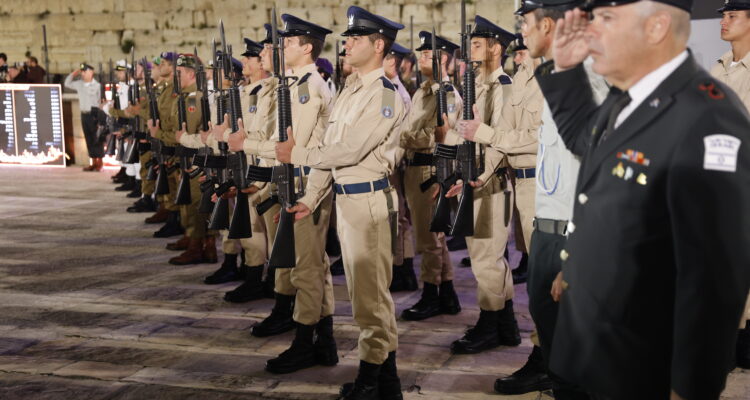|
Getting your Trinity Audio player ready...
|
Israel drew to a standstill on Monday evening as Israelis ushered in Memorial Day with a minute-long silence in honor of the country’s 28,468 fallen soldiers and terror victims.
Fifty-nine soldiers were killed during active military service since Israel’s last Memorial Day, with another 86 dying from complications from injuries sustained prior to that, bringing the total number of fallen soldiers to 24,213, according to Defense Ministry numbers.
The somber day also marked the deaths of 4,255 victims of terror.
The annual Memorial Day opening ceremony began at the Western Wall plaza at 8 pm on Monday, in the presence of President Isaac Herzog and IDF Chief of Staff Herzi Halevi.
Herzog, reflecting on the siren marking the one-minute silence, called for unity at a time of “discord.”
“I ask myself, I ask us: what other country in the world has such a special sound? It is the sound of pain and of hope, of grief, and of pride. It is the sound of the State of Israel,” he said.
“A sound that calls on us to pause for a moment, to lock in the sanctity, to remember and to connect — together. This year, in the throes of these days of discord, this sound is more powerful, more forceful, more pained and more painful than ever.”
“This year, more than ever before, this sound calls on us, all of us, together! Their sacrifice has not been in vain – it shall not have been in vain.”
“I appeal to you, my brothers and sisters, citizens of Israel, at this holy moment, from here, the wailing wall, from which the Divine Presence has never shifted, and I ask us to mourn and grieve — together. May we let that feeling of yearning envelop us, together. May we let that sound of our collective pain ring loudly on this Memorial Day, without discord, as we cry for our sons and daughters. Even as we refuse to find comfort, for they are no more.”
Halevi, who, as a religiously observant Jew, is a rarity among IDF chiefs of staff, delivered a message laced with Talmudic references while calling on would-be protesters to respect the bereaved families.
“Tomorrow, we will stand by the side of the families in the cemeteries. I hope that on this day… we will adhere to our heritage and devote ourselves exclusively to solidarity with the memory of the fallen and with our pain over their passing. Above all, and beyond all controversy,” Halevi says.
“Controversy is, perhaps, the most beautiful gift the Jewish people gave to humanity. The people of Israel have been carrying Hillel and Shammai for about 2,000 years,” Halevi went on.
“In the Gemara, it is said that although Beit Shammai and Beit Hillel were divided, they did not refrain from marrying each other. To teach you, that affection and deep friendship are needed to fulfill the saying: ‘Truth and peace loved.’”
“Out of our responsibility to protect the memory of the fallen, tomorrow we will keep the affairs of the hour outside the cemeteries,” Halevi said, in a veiled reference to the judicial reform controversy. “We will allow families, commanders, and soldiers to… honor the memory of the fallen.”
Ordinarily, hundreds of thousands of Israelis gather in military cemeteries across the country to commemorate soldiers who have fallen in Israel’s wars and military operations.
But this year, numerous government ministers and MKs have declined to participate in the ceremonies, citing concerns that their presence may ignite protests from bereaved families who are vehemently opposed to judicial reform.
Some families have demanded that lawmakers who did not serve in the IDF not attend ceremonies. They’ve also argued that politicians who criticized reservists for their refusal to serve, as part of a protest against the reforms, should be excluded from official events.





